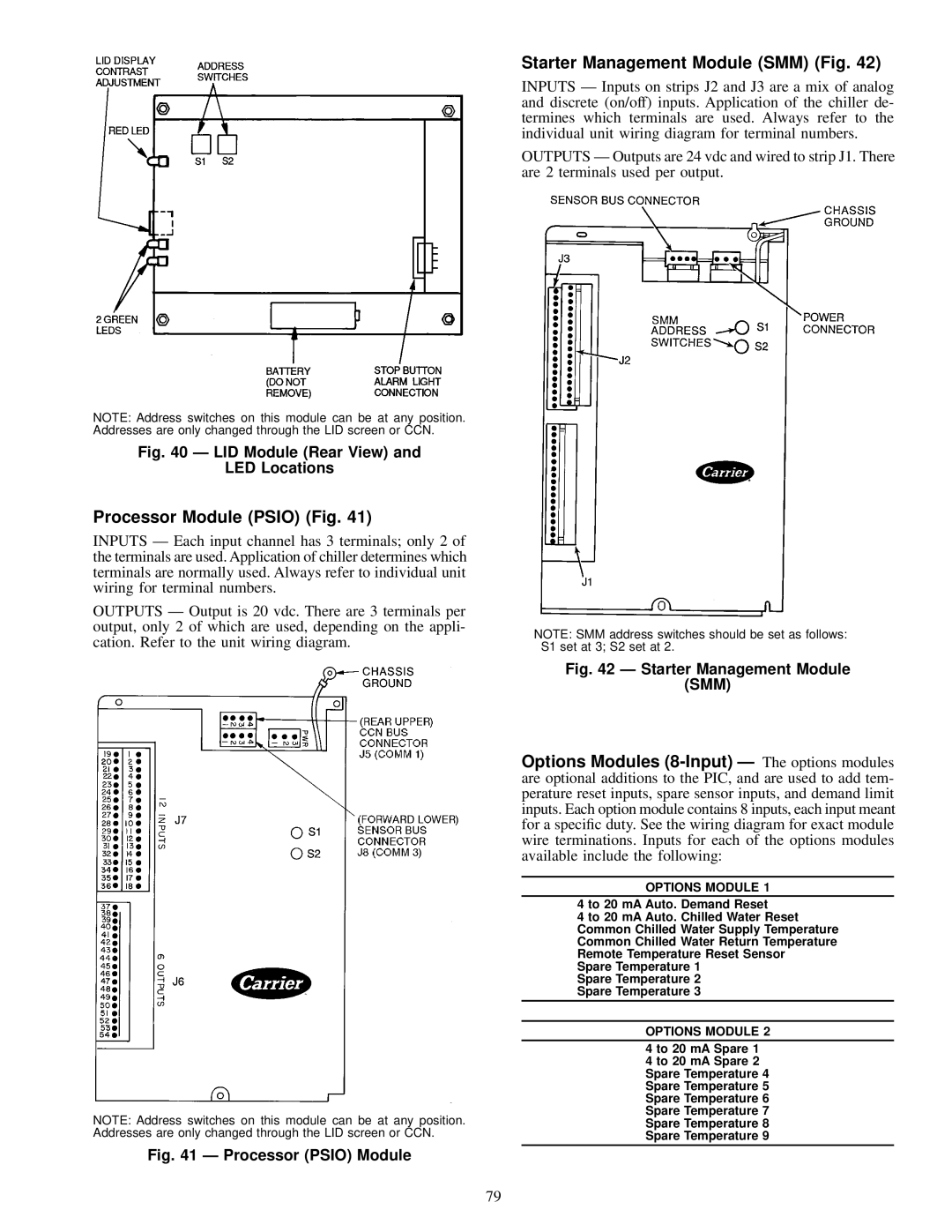Safety Considerations
Start-Up, Operation, and Maintenance Instructions
Contents
Contents
Abbreviations and Explanations
Introduction
Refrigeration Cycle
Chiller Familiarization
MOTOR/OIL Refrigeration Cooling Cycle
19XL Rear View
Cooler Pressure Schrader Fitting
Take-Apart Rabbet Fit Connector
Cooler In/Out Temperature Sensors
Condenser In/Out Temperature Sensors
Refrigerant Motor Cooling and Oil Cooling Cycles
Lubrication Cycle
Lubrication System
Unit-Mounted Solid-State Starter Optional
Starting Equipment
PIC Component Panel
Denitions
Controls
Major PIC Components Panel Locations
Pressure Transducer, Typical
19XL Controls and Sensor Locations
Control and OIL Heater Voltage Selector S1
Power Panel with Options
General
LID Operation and Menus Fig
Select
Override Operations
− Example of Point Status Screen Status01
Example of Time Schedule Operation Screen
19XL Menu Structure
19XL Service Menu Structure
19XL Service Menu Structure
Example of Set Point Screen
Setpoint
Menu Status Select
Description Range Units Reference Point Name Alarm History
LID Screens
Example 1 Ð STATUS01 Display Screen
Menu
Example 2 Ð STATUS02 Display Screen
Example 3 Ð STATUS03 Display Screen
Example 4 Ð Setpoint Display Screen
ICE Build Termination
Example 5 Ð Configuration Config Display Screen
Example 6 Ð LEAD/LAG Configuration Display Screen
ECW Control Option
Example 7 Ð SERVICE1 Display Screen
Menu Service
Example 8 Ð SERVICE2 Display Screen
Spare Alert Enable
Example 9 Ð SERVICE3 Display Screen
Bearing Temperature
Example 10 Ð Maintenance MAINT01 Display Screen
Example 11 Ð Maintenance MAINT02 Display Screen
Discharge Temperature
Example 13 Ð Maintenance MAINT04 Display Screen
Example 12 Ð Maintenance MAINT03 Display Screen
Description RANGE/STATUS Units Reference Point Name
PIC System Functions
Page
Protective Safety Limits and Control Settings
Capacity Overrides
Page
Page
Hot Gas Bypass
Lead/Lag Control
ECW
Hgbp
Page
Cent Capacity
Ice Build Control
Page
To LOG on
Example of Attach to Network Device Screen
Sequence Fig
START-UP/SHUTDOWN/RECYCLE
Recycle Restart Delta T
Equipment Required
Using the Optional Storage Tank and Pumpout
Before Initial START-UP
Job Data Required
19XL Leak Test Procedures
Page
Ð HCFC-22 Pressure Ð Temperature C
Ð HCFC-22 Pressure Ð Temperature F
Ð HFC-134a Pressure Ð Temperature C
Ð HFC-134a Pressure Ð Temperature F
Temperature Pressure
Page
Check Optional Pumpout Compressor Water Pip
Inspect Wiring
MECHANICAL-TYPE Starters
Check Starter
BENSHAW, INC. SOLID-STATE Starter
Benshaw, Inc. Solid-State Starter Power Stack
Set Up Chiller Control Conguration
Power Up the Controls and Check the Oil Heater
Load Surge Prevention Occurs TOO Soon Occurs TOO Late
Volt Motor Code
Amps Correction Factors For 19XL Motors
Tests to be Devices Tested Performed
Charge Refrigerant into Chiller
19XL Chiller Equalization Without PUMP- OUT Unit
Control Test Menu Functions
Size
Refrigerant Charges
19XL Total Refrigerant Charge
Cooler
Dry Run to Test Start-Up Sequence
Initial START-UP
Check Rotation
Operator Duties
Check Oil Pressure and Compressor Stop
Calibrate Motor Current
Operating Instructions
To Stop the Chiller
Plant
Tstat
Pumpout and Refrigerant Transfer Procedures
Operating the Optional Pumpout Compressor
Transfer Refrigerant from Storage Tank to Chiller
Transfer the Refrigerant from Chiller to Storage Tank
Chillers with Isolation Valves
Test After Service, Repair, or Major Leak Ð If
General Maintenance
Return Refrigerant to Normal Operating Conditions
Guide Vane Actuator Linkage
Weekly Maintenance
Check Safety and Operating Controls Monthly
Scheduled Maintenance
To Change the OIL
Inspect the Heat Exchanger Tubes
Compressor Bearing and Gear Mainten
Optional Pumpout System Controls
Troubleshooting Guide
MAINT04
MAINT01
MAINT02
MAINT03
Timing OUT or Timed OUT
Shutdown with ON/OFF/RESET-OFF
Normal or AUTO.-RESTART
Recycle Shutdown
Autorestart in Progress
LOW Chilled Water
Compressor Jumpstart and Refrigerant Protection
Normal RUN with RESET, TEMPERATURE, or Demand
OUT-OF-RANGE Sensor Failures
Normal RUN Overrides Active Alerts
Limited
Protective Limit
Chiller Protect Limit Faults
Spare Sensor Alert Messages
Chiller Alerts
DESCRIPTION/MALFUNCTION Probable CAUSE/REMEDY
Other PROBLEMS/MALFUNCTIONS
Temperature Voltage Resistance Drop
Ð Thermistor Temperature F vs Resistance/Voltage Drop
Ð Thermistor Temperature C vs Resistance/Voltage Drop
Module Address
Control Modules
Input Options Module
Processor Module Psio Fig
Starter Management Module SMM Fig
Options Module
Switch Options Setting Module
Installation
Typical Benshaw, Inc. Solid-State Starter internal View
Page
Page
SCR
Benshaw, Inc. Solid-State Starter Troubleshooting Guide
Problem Probable Causes Area of Correction
RV1
Condenser
Heat Exchanger Data
Additional Data for Marine Waterboxes
Cooler
1034 kPa
Waterbox Cover Weights
Coolers
Condensers
Compressor Weights
Compressor/Motor Weights
Optional Pumpout System Electrical Data
Compressor Fits and Clearances
``Z
Compressor Assembly Torques
Description Torque
Ft-lb
EXT
CLR
COM
Comm
Page
CLR
Page
Chiller Power Panel, Starter Assembly Motor Wiring Schematic
Chiller Power Panel, Starter Assembly Motor Wiring Schematic
HPS
PMR
POT
GFR
Typical Wye-Delta Unit Mounted Starter Wiring Schematic
Index
Index
Copyright 1996 Carrier Corporation

